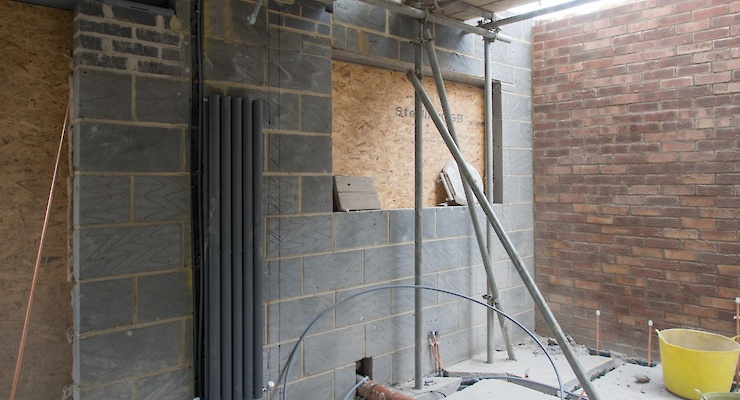


Head of Content

Mortgage Advisor & Director

When it comes to home improvements, most of us are limited by what we can afford. But what if you could find a way to get around those limitations? In this post, we'll explore the possibility of remortgaging to fund an extension on your home. Read on to learn more.
Can you remortgage to fund an extension?
Yes. This would essentially be a remortgage to release equity from your property for the purpose of home improvements, which the vast majority of mortgage lenders allow.
You will need to hold enough equity in your property to qualify for a remortgage with additional borrowing and undergo an eligibility assessment, but in theory, it is certainly possible to refinance to cover the cost of extending your home.
Building an extension is a popular reason to release equity. Not only will it give you extra space, but it can also add value to your property. However, extensions can be expensive, which might be having to release a relatively high amount of capital from your home.
How does remortgaging for an extension work?
If you're a homeowner, you may be able to remortgage your property in order to raise the funds for an extension by releasing equity from your property when you refinance.
Remember that remortgaging is a big financial commitment and it's not something to be entered into lightly. You'll need to weigh up the pros and cons before making a decision.
If you're thinking of remortgaging to fund an extension, here are a few things to bear in mind:
-
The process of remortgaging can be complex and time-consuming. You'll need to shop around for the best deal and go through the application process all over again.
-
You'll likely have to pay fees and charges associated with taking out a mortgage, such as valuation fees, legal fees and arrangement fees.
-
Your monthly payments are likely to go up assuming you are borrowing extra.
-
If you have a fixed-rate mortgage, you may have to pay early repayment charges if you remortgage before the end of your fixed term.
-
It's worth getting professional advice before making any decisions about remortgaging. A mortgage advisor (like our experts at Teito) can help you understand the process and find the best deal for your circumstances.
Is remortgaging for home improvements a good idea?

Remortgaging to finance home improvements, such as a house extension, can be a good idea if you're struggling to afford the costs upfront. Depending on the type of work you're doing, home improvements can add thousands to the value of your home, so it's worth considering this option if you're looking to add value to your property.
However, it's important to remember that remortgaging is a big financial commitment and it's not something to be entered into lightly. You should consider your personal circumstances and how long you're planning to carry on living in your home before making any decisions.

Speak to a broker who specialises in home improvement remortgages
Do you need to tell your mortgage lender if you’re building an extension?
Yes, you should notify your current mortgage lender if you're planning to make any changes to your property, such as building an extension, even if you are funding it yourself.
You should also contact your insurer to check if you'll be covered during the work. You may need to get more insurance during and even after the work is complete.
How much equity will you need to hold?
The amount of equity you need to remortgage for home improvements will depend on the value of your home and how much you want to borrow. Generally speaking, you'll need at least 20% equity in your property in order to remortgage (80% LTV).
The best way to find out if you have the right amount of equity in your home is to get it valued. Once you know the value of your property, you can then work out your equity.
If you're thinking of remortgaging to fund an extension, it's important to speak to a mortgage broker first. They'll be able to tell you how much equity you need and whether or not you're eligible to remortgage.
Do you need planning permission?
You may be able to make certain changes to your property without needing full planning permission.
However, there are some restrictions and limitations in place. For example, you may only be able to build a single-storey extension or you may need to adhere to certain size limits.
Alternatives to consider

If you're planning to make home improvements but don't think you'll be able to remortgage, there are other options available to you. They include…
Further advance
If you have a mortgage with your current lender, you may be able to apply for a further advance. This is an additional loan that's added to your current mortgage deal.
Further advances can be a good way to finance home improvements, but they're not suitable for everyone. You'll need to have equity in your property and pass a credit check in order to apply for a further advance.
You should also be aware that further advances typically have higher interest rates than your original mortgage. This means you could end up paying more interest over the term of your loan.
Before you apply for a further advance, make sure you compare the different options available to you. You may be able to get a personal loan with a lower interest rate, or you could remortgage to a new lender.
Home improvement loans
Home improvement loans are becoming increasingly popular and there are a number of different products on the market.
In smaller amounts, they may be provided in the form of an unsecured loan, meaning you won't need to put your property up as collateral. However, for larger amounts, loans are typically secured against your property.
As with any loan, it's important to compare the different home improvement loans available before you make a decision. Some things you may want to consider include the interest rate, repayment terms and whether or not you need to provide security.
Secured loans
Secured loans are backed by your property. This means that if you default on the loan, your lender could repossess your home.
Secured loans tend to have lower interest rates than unsecured loans, but they're not suitable for everyone. If you're thinking of taking out a secured loan, make sure you can afford the monthly repayments as well as your other financial commitments.
With a secured loan, you should also be aware that if you miss payments, your home could be at risk of repossession.
Bridging finance
Bridging loans could be a viable alternative to remortgages if you need the funds for your extension quickly. They are fast to arrange and come with a short term length, but the interest rates can be high.
If you were using a bridging loan to pay for an extension, the way it would be usually work is you would remortgage against the increased value of your property post-completion as a way of clearing the debt, or use the proceeds from the sale of the property if you plan is to offload it at a profit following the home improvements.
What if you have a history of bad credit?
If you have a bad credit history or adverse credit, you may struggle to remortgage or get the finance you need for an extension. This is because mortgage lenders will be reluctant to lend to you if they think there's a risk you'll default on the loan.
Your best chance is by getting independent mortgage advice. A mortgage advisor will be able to recommend the right mortgage and secured loan providers, many of whom specialise in lending to people with bad credit.
This is a big financial commitment and it's not something to be entered into lightly. It's important to get advice from an experienced mortgage advisor who can help you find the right deal for your circumstances.
How much you could borrow for your extension
The total amount you can borrow would typically be up to 80% of your property’s value, so there will still need to be 20% equity remaining in your home after you have released the funds for your extension.
Most lenders will also cap your borrowing at 4.5 times your annual salary, but some go higher than this. You can use our affordability calculator below to get an idea of your borrowing potential.
Which mortgage lenders are available?
Virtually every mortgage lender in the UK will let your remortgage to fund the cost of an extension, provided you hold enough equity and satisfy their eligibility criteria.
Below you will find specific examples of lenders you could consider and some of the specific criteria they use to assess your application against:
-
Nationwide: Will consider applicants with 85% LTV or lower.
-
Bank of Ireland: Will consider applicants with 85% LTV or lower.
-
Principality Building Society: Will consider applicants with 90% LTV or lower.
-
Nottingham Building Society: Will consider applicants with 80% LTV or lower.
How to remortgage to fund an extension
If you're thinking of funding home improvements and need help finding the right financing option for you, speak to a mortgage broker. They'll be able to compare the different options and find the best deal for your circumstances.
At Teito, we work with hundreds of mortgage lenders including those who specialise in remortgaging for an extension or other improvements. We've transformed the mortgage process to make it as stress-free and streamlined as possible, and our expert advisors are there every step of the way.
Getting started is easy - make an enquiry and we’ll introduce you to a broker who specialises in remortgages for home improvement purposes.
FAQs
Compared to other purposes for releasing equity, such as debt consolidation, it is relatively straightforward to refinance to fund an extension. The loan-to-value requirements and eligibility criteria are generally less stringent, and lenders generally don’t have a problem with it since it will add value to your property and make it more sellable.
One of the few complications that can arise is being locked into a fixed rate mortgage and having to pay an early repayment charge to break out of it, but this can be avoided by aligning your plans with the end of your fixed rate period.
Choosing an Adviser
Selecting a qualified and experienced mortgage adviser is of great importance. To choose a suitable adviser, evaluate their qualifications, experience, and reputation, and ensure they are regulated by the Financial Conduct Authority (FCA).
Read reviews from previous clients and make sure they provide a clear explanation of the products and services they offer, as well as the fees and charges associated with them.





















































































































































